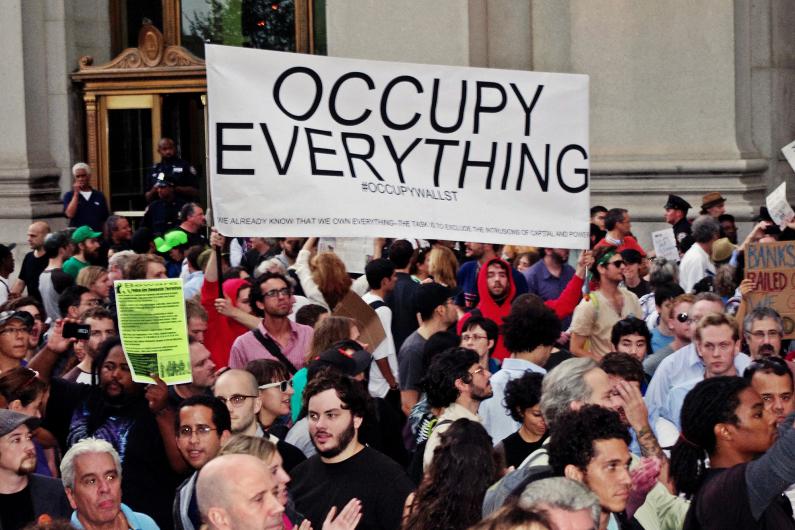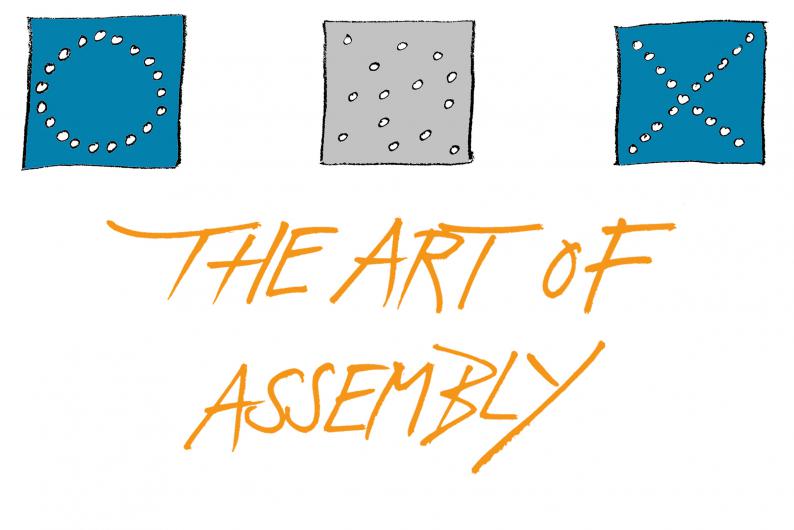With Judith Butler & Max Haiven. Hosted by Florian Malzacher
Gesellschaftsspiele. The Art of Assembly VIII – In cooperation with Volksbühne Berlin am Rosa-Luxemburg-Platz
10 YEARS OCCUPY WALL STREET
About ten years ago the series of square occupations all over the world begun – after Tunis, Cairo, Athens, Madrid the wave swept over to New York. Mid-September 2011 the fist protest begun in the midst of Lower Manhattan’s bank towers: Occupy Wall Street became a symbol of resistance against financial capitalism and big corporations. And it’s assemblies set examples for a different way of discussing and decision making that influences activists all over the word but also resonated in theatre and art.
 Visit art-of-assembly.net for videos, podcasts and background info
Visit art-of-assembly.net for videos, podcasts and background info
On the occasion of the 10th anniversary of the occupation of Zucchotti Square the 8th edition of The Art of Assembly takes a close look at its legacy: Philosopher Judith Butler, author of the probably most influential book on assemblies in recent years, revisits (via Zoom) her famous speech at OWS where she pointed out the performative dimension of this assembly of bodies. Writer and activist Max Haiven summons the ghosts of Occupy and looks back – in the the spirit of the late anthropologist and OWS key figure David Graeber – at a haunted decade.
Gesellschaftsspiele. The Art of Assembly is a series of lectures and conversations on the potential of assemblies in activism, art and politics hosted by Florian Malzacher. Former and future guests include Judith Butler, Jodie Dean, Radha D`Souza, Didier Eribon, Max Haiven, Oliver Marchart, Alia Mossallam, Chantal Mouffe, Sibylle Peters, Milo Rau, Oliver Ressler, Jonas Staal & Dana Yahalomi. The series is produced by brut Wien, in cooperation with Münchner Kammerspiele, Wiener Festwochen and Volksbühne am Rosa-Luxemburg-Platz.
About The Art of Assembly. Lectures, discussions, online platform
Whether in Tunis, Cairo, Madrid, or Lisbon, in Athens, New York, London, or Istanbul, in post-Fukushima Tokyo, in the midst of Niemeyer’s iconic parliamentary architecture in Brasilia, under the umbrellas of Hong Kong, or on the streets of Minneapolis: social and political movements of recent years have often been characterised by their search for alternative forms of gathering, of arguing and making decisions, of negotiating community and society. The potential of these assemblies lies in more than just the demands they put forward; many of them change reality merely by practicing radical models of democracy.
The arts have also shown a renewed interest in concepts of gathering and creating public spheres in which society is not only mirrored but constantly tried out, performed, tested, reimagined, or even reinvented. There are court hearings on artistic freedom, religion, and censorship; tribunals on exploitation and violence; summits on climate change or cultural policy; parliaments allowing those who are usually silenced to speak... Theatre in particular has become a stage for assemblies on the fine line between art and reality, a democratic arena of radical imagination.
But what is the future this concept of gathering has ahead of it after months in a state of emergency that has thrown pretty much all areas of social life out of step? Gesellschaftsspiele: The Art of Assembly brings together protagonists from various fields of art, politics and theory to speculate on the future of assembly in a time of experiencing that nothing is certain – a time in which every form of physical togetherness has become precarious.
Florian Malzacher is a curator, dramaturg and writer. 2013-2017 he was artistic director of Impulse Theater Festival (Cologne, Dusseldorf and Mulheim/Ruhr), and 2006–2012 co-programmer of the multidisciplinary arts festival steirischer herbst (Graz). He (co-)curated e.g. the 4th and 5th International Summer Academy (Mousonturm Frankfurt, 2002 and 2004), “Dictionary of War” (2006/07), “Truth is concrete” (Graz, 2012), “Artist Organisations International” (HAU Berlin, 2015), “Appropriations” (Ethnological Museum Berlin, 2014), “Sense of Possibility” on the occasion of the 100th anniversary of the revolution (St. Petersburg, 2017), “Training for the Future” (Ruhrtriennale 2018/19 with Jonas Staal), “After Supervising the Machinery” (2020). As a dramaturge he worked with artists like Rimini Protokoll (DE), Lola Arias (ARG), Mariano Pensotti (ARG), and Nature Theater of Oklahoma (USA). Florian Malzacher has edited and written numerous essays and books on theatre and performance and on the relationship between art and politics. His latest publications include Gesellschaftsspiele. Politisches Theater heute im Alexander Verlag Berlin. florianmalzacher.tumblr.com
The Art of Assembly is based on
Florian Malzacher. Gesellschaftsspiele. Politisches Theater heute. Berlin: Alexander Verlag, 2020.
Credits
The Art of Assembly – Gesellschaftsspiele, a series by Florian Malzacher and brut Wien, in cooperation with Münchner Kammerspiele, Wiener Festwochen and Volksbühne am Rosa-Luxemburg-Platz
Dates & Tickets
September 2021
Online Livestream via www.brut-wien.at
Online Livestream
brut all over Vienna
brut nordwest
accessible
Nordwestbahnstraße 8-10, 1200 Vienna
Subway: U1, U2 (Praterstern), U4 (Friedensbrücke), U6 (Dresdnerstraße) Tram: 5 (Nordwestbahnstraße) Bus: 5A (Wasnergasse)
accessible
studio brut
not accessible
Zieglergasse 25, 1070 Wien
Subway: U3 (Zieglergasse), Tram: 49 (Westbahnstraße / Zieglergasse)
not accessible
Bears in the Park Art Place
not accessible
Eyzinggasse 12, 1110 Vienna
U-Bahn: U3 (Gasometer) Bus: 72A (Gasometer), 76A, 76B (Simoningplatz)
not accessible
WUK performing arts
barrierefrei
Währinger Straße 59, 1090 Vienna
Subway: U6 (Währinger Straße / Volksoper), Tram: 40, 41, 42 (Währinger Straße / Volksoper), 5, 33 (Spitalgasse), 37, 38, 40, 41, 42 (Spitalgasse / Währinger Straße)
Der Betrieb
accessible
Vogelweidplatz 13, 1150 Wien
Subway: U6 (Burggasse-Stadthalle) / Bus: 48A (Moeringgasse) / Tram: 9 (Camillo Sitte Gasse)









